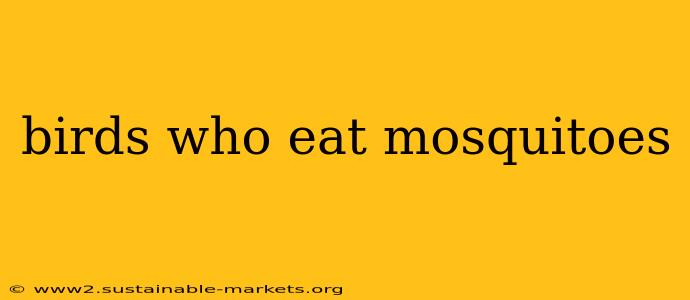Mosquitoes. The tiny, buzzing insects that plague our summers, spreading diseases and leaving itchy welts in their wake. But there's a natural, effective way to control these pests: attracting birds that feast on them. This guide explores various avian species that enjoy a mosquito-rich diet, offering insights into attracting them to your yard and contributing to a healthier, more mosquito-free environment.
Top Mosquito-Eating Birds
Several bird species actively hunt and consume mosquitoes, providing a valuable ecological service. While no bird exclusively eats mosquitoes, many include them as a significant part of their diet, particularly during mosquito breeding seasons. Here are some notable examples:
1. Purple Martins: The Mosquito-Control Champions
Purple martins are arguably the most effective mosquito-eating birds. Their diet consists largely of flying insects, with mosquitoes forming a substantial portion. These large, charismatic birds are highly social and often nest in colonies, making them a spectacular addition to any landscape. Attracting purple martins requires providing appropriate nesting structures, often called martin houses.
2. Barn Swallows: Agile Aerial Acrobats
Barn swallows are another excellent choice. These graceful birds are incredible aerial hunters, adept at snatching insects in mid-flight. Their diet includes a variety of flying insects, with mosquitoes featuring prominently. Providing nesting sites, such as open-sided barns or artificial nesting structures, can encourage them to settle near your home.
3. Tree Swallows: Forest Dwellers with a Taste for Mosquitoes
While less prolific mosquito eaters than martins or barn swallows, tree swallows still contribute to mosquito control. They readily consume a wide range of flying insects, including mosquitoes, making them valuable allies in the fight against these pests. They prefer nesting boxes placed near water sources and trees.
4. Nightjars & Nighthawks: Nocturnal Hunters
While often overlooked, nightjars and nighthawks are important nocturnal mosquito predators. These crepuscular birds are active at dawn and dusk, precisely when many mosquitoes are most active. Providing suitable roosting areas and avoiding artificial lighting can encourage their presence.
Attracting Mosquito-Eating Birds to Your Yard
Creating a welcoming habitat is crucial for attracting these beneficial birds. Here are some key strategies:
1. Provide Nesting Sites:
Offer a variety of nesting structures tailored to different bird species. This could include martin houses, barn swallow shelters, and tree swallow nesting boxes. Ensure these structures are placed strategically, away from predators and in suitable locations.
2. Plant Native Vegetation:
Native plants offer food and shelter for insects and birds. They also provide natural camouflage and nesting materials for the birds. Choose plants that attract other insects, which in turn attract insectivorous birds.
3. Eliminate Pesticides:
Avoid using chemical pesticides, as these can harm birds and the insects they rely on for food. Opt for natural pest control methods whenever possible.
4. Provide a Water Source:
Birds need a reliable water source for drinking and bathing. A birdbath or a shallow dish of water will attract a variety of birds.
5. Offer Supplemental Food (Sparingly):
While not strictly necessary, supplementing bird food with seeds or suet during lean times can encourage birds to stay in your area. However, focus primarily on creating a healthy habitat that supports their natural food sources.
Conclusion: A Natural Approach to Mosquito Control
By understanding the dietary preferences of different bird species and taking steps to create an attractive habitat, you can significantly reduce your mosquito population naturally and sustainably. Remember, attracting these birds is not only an effective pest control method but also a rewarding experience, enriching your backyard with the beauty and activity of nature's own mosquito control team.

